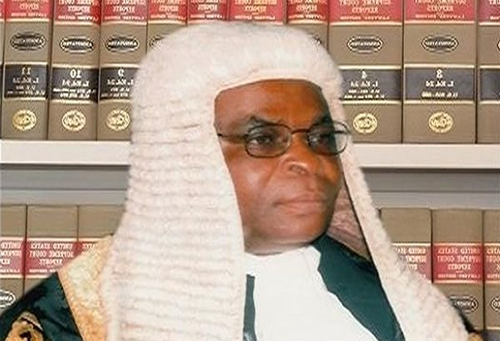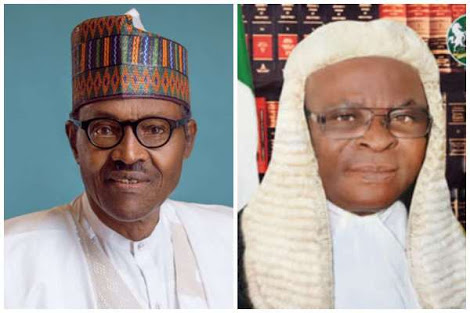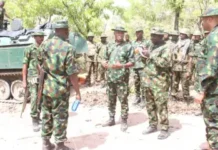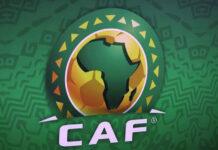All was set last night for Monday’s arraignment of the Chief Justice of Nigeria (CJN), Justice Walter Onnoghen before the Code of Conduct Tribunal (CCT) over alleged infractions of the CJN’s assets declaration.
Justice Onnoghen is being arraigned by the Code of Conduct Bureau (CCB) following a January 7 petition alleging non-declaration and false declaration of his assets between 2005 and 2016.
The petition lodged by Anti-Corruption and Research Based Data Initiative (ARDI) drew the CCB attention to what it called serious concerns bordering on flagrant violation s of the law and constitution of Nigeria by the CJN.
He was said to have been confronted with the purported evidence of false assets declaration and huge lodgments of local and foreign currencies by him into accounts which he allegedly failed to declare in the forms he filled and submitted to the CCB.
But Justice Onnoghen said he did no wrong to warrant his arraignment as, according to him, he satisfied the requirements of publicly declaring his assets as a senior government functionary in the judiciary.
He explained what led to the submission of two assets declaration forms on the same day in 2016 after becoming the CJN. Justice Onnoghen said he forgot to update the assets he declared in the 2005 at its expiration in 2009.
According to the CCB regulations, assets declaration is renewable after every four years by public officers. This is to accommodate updates and amendments.
But the planned arraignment has been drawing reactions from individuals and groups, with many urging the Federal Government to apply caution in its handling of the matter.
Those who reacted include: legal luminary and founder of the Afe Babalola University, Ado-Ekiti (ABUAD) Aare Afe Babalola, Senate President Bukola Saraki and Peoples Trust Presidential (PT) presidential candidate Gbenga Hashim-Olawepo.
The groups are: the Nigerian Bar Association (NBA) and the ruling All Progressives Party (APC).
Reacting, Aare Babalola said he was taken aback by the alleged gaps in the CJN’s assets declaration just as he was shocked by last year’s raid on the homes of some judges by the Department of State Services (SSS).
He, however, cautioned: “Again, I say, two wrongs do not make a right.” The legal icon warned against impunity.
He said: “Thus the point can even be made, that unlike other judicial officers who can be removed by the President acting upon the recommendation of the National Judicial Council, the CJN can only be removed by the President upon receipt of an address supported by two-thirds majority of the Senate!…”
But the Chairman of the Presidential Advisory Committee on Corruption (PACAC) Prof Itse Sagay, differed.
He said the Nganjiwa v Federal Republic of Nigeria (2017) LPELR-43391(CA) being cited cannot apply to the CJN case. He said it was wrong for judges to seek judicial immunity for alleged misdeeds.
Dr. Saraki cautioned the government so that the plan to put CJN on trial does not cause chaos in the judicial system.
He urged the Federal Government to ensure that due process is not compromised in the planned trial of Justice Onnoghen.
Olawepo Hashim Olawepo-Hashim described the development as a serious threat to constitutional democracy and rule of law.
He warned: “The principle of separation of powers on which democratic order stands should not be destroyed due to power play or because of any other reason.”
NBA President Paul Usoro, SAN, described the development as an assault, intimidation and desecration of the judiciary that must stop.
Usoro said: “Any infraction in that regard by a judicial officer, as the Court of Appeal rightly held, constitutes a misconduct by the judicial officer and becomes the subject matter for discipline by the NJC as a condition precedent to any possible prosecution of the judicial officer by any of the FGN’s prosecuting agencies.
“Why has FGN decided to embark on this anomalous course of charging the CJN before the CCT without first presenting whatever facts it purportedly has against His Lordship to the NJC for its deliberation and determination?
“The Petition that triggered the CCB action was on its face received by the Bureau on 09 January 2019 and the Charge was promptly drafted and is dated the following day, 10 January 2019 – giving the CCB a record 24 hours for completion of its investigation and the drafting of the said Charge and ancillary processes!”



























